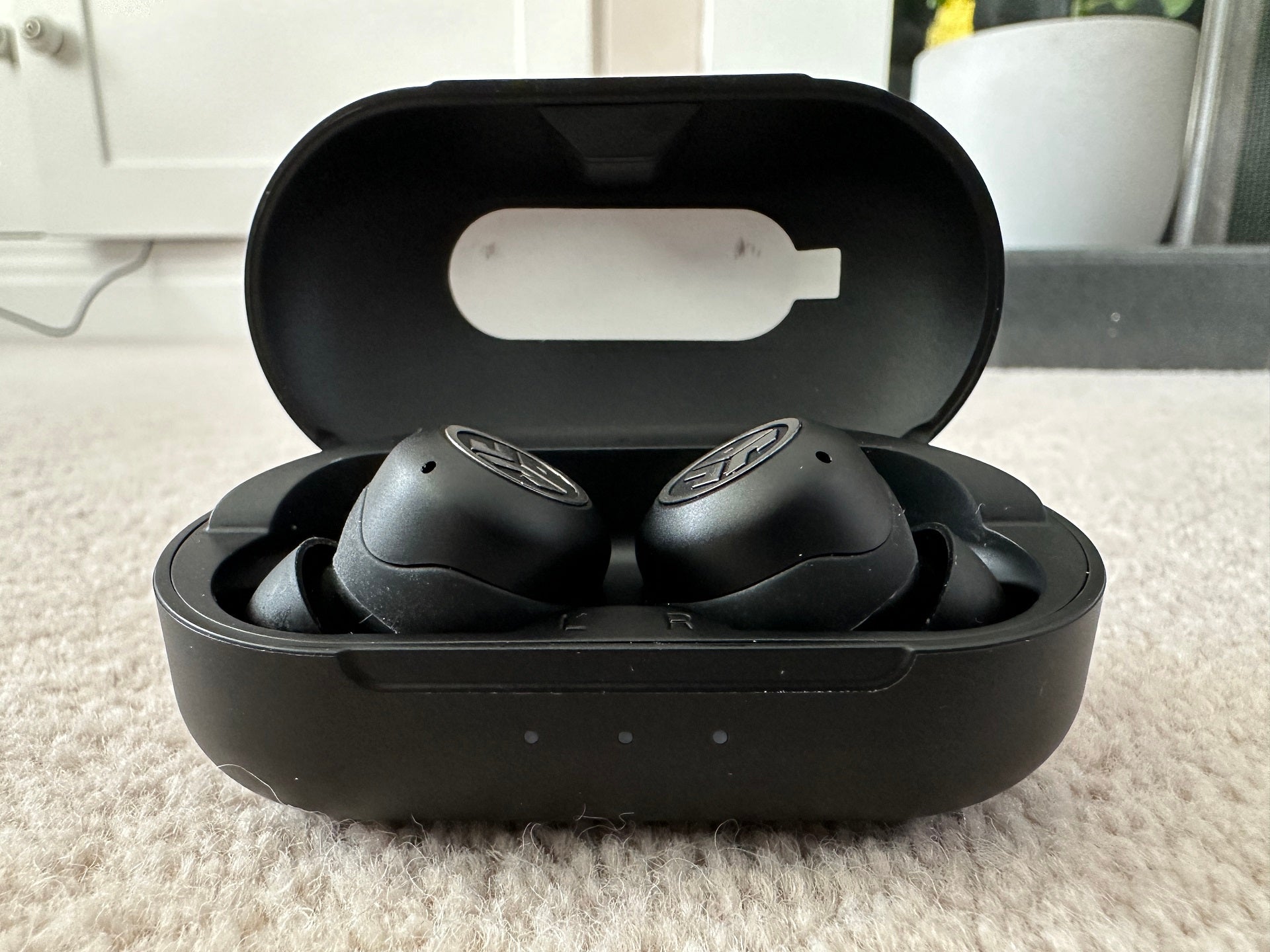Verdict
An affordable pair of buds with decent battery life and a handy charging cable built into the case, but they go too big on the bass.
Pros
- Lengthy battery life
- Built-in charging cable
- Tile support
Cons
- Overly bassy sound
- Complicated controls that can be fussy
Availability
- UKRRP: £50
- USARRP: $59
- EuropeTBC
- CanadaTBC
- AustraliaTBC
-
WaterproofingEarbuds are rated IP55 to resist water -
Google Fast PairQuick pairing with Android devices -
Custom soundCustomise the audio with three EQ options
Introduction
How many USB cables have you got stashed away at home? Probably more than you’ve got devices that use them, right? Well, they can all stay in that drawer full of random wires, because JLab’s JBuds Air Pro earbuds come with a case that includes its own integrated charging cable.
That’s something of a trademark when it comes to JLab’s true wireless headphones, and at £50 the JBuds Air Pro sit in the middle of the range. That means there’s no ANC and they’re only water resistant rather than fully waterproof, but you do get features that aren’t found on all buds around this price, including Multipoint Bluetooth, which means you can connect two different devices at once and switch easily from one to the other, a low-latency mode for watching videos, Tile tracking support, and a Be Aware mode.
So how do they stack up against so much competition?
Design
- Lightweight plastic build
- Slightly complicated controls
- Integrated charging cable
The JBuds Air Pro aren’t going to win any awards for design, but the black plastic buds feel like they’d endure the rough and tumble of day-to-day life.
Each one has both a standard ear tip and a Cush Fin – basically just a circular bit of rubber that is supposed to improve the seal between the bud and your ear. There are three of each included in the box, so finding a combination that suits you shouldn’t be a problem, although plenty of other pairs come with more.
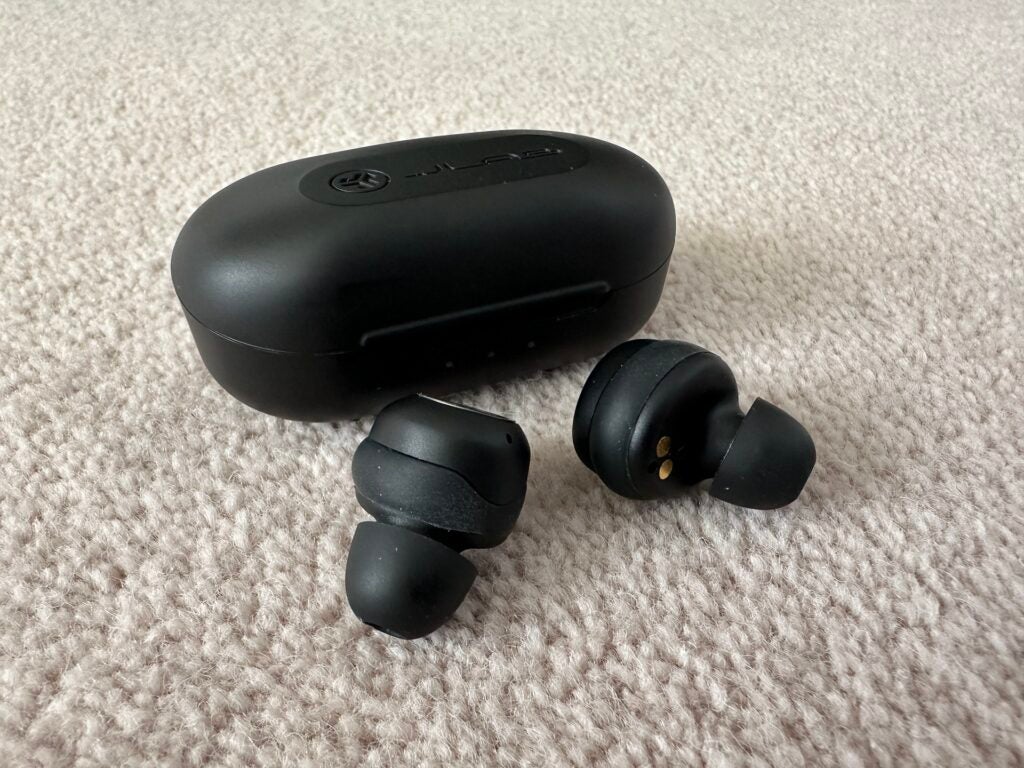
The silver JLab logo on each bud also indicates where the touch-sensitive areas are, but I found the controls are a bit on the fussy side. I had to be pretty deliberate with my taps to get them to register, although more problematic is the number of commands there are to memorise: five for the left bud and a frankly ridiculous eight for the right.
Just pausing your tunes takes two taps, which feels like one too many, and if you accidentally trigger the Be Aware mode it’s hard to remember how to turn it off again. Is it two taps or three? And on the left or right bud?
The JBuds Air Pro’s IP55 rating is handy rather than hardcore. That’s only enough to shrug off splashes of water, so you’ll need to be careful not to fully submerge them, but they’ll put up with rain and sweat, although the fit isn’t really secure enough for anything too vigorous.
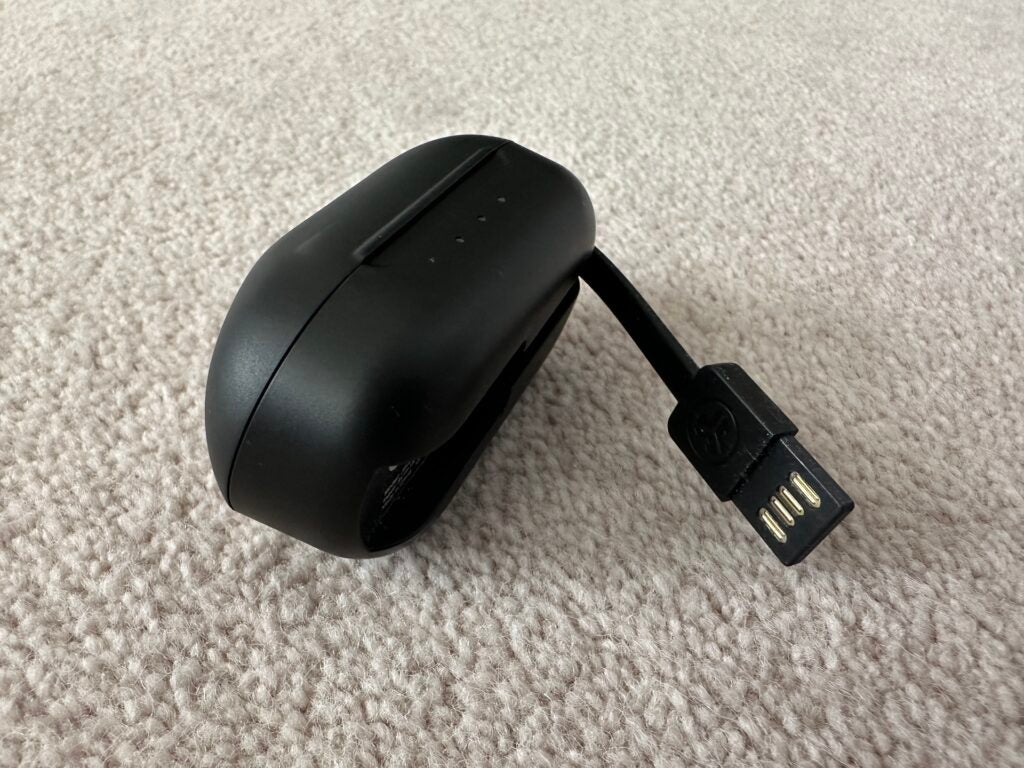
That rating also only applies to the buds, not the case. It isn’t the smallest out there, but it’s not obnoxiously large either, despite having the charging cable built in. This is a neat touch that means you can charge the JBuds straight from a USB port, but if anything were to go wrong with it there’s no back-up, which could affect the lifespan of the buds. Considering the low price tag, though, that’s not a huge concern.
Features
- No noise-cancelling
- Low-latency mode
- Built-in Tile tracking
The JBuds Air Pro don’t have noise-cancelling, so you’re relying on passive sound isolation to block out any environmental racket that might infringe on your listening, but there is a Be Aware mode that activates the microphones and lets in some of the outside world.
It takes three taps on the right earbud to activate, so if you want to talk to someone it’s far quicker and easier just to take one of the earbuds out. They will automatically pause what’s playing when you do this, but if you’re not careful how you hold the buds it can be very easy to accidentally activate the controls.
As a means of maintaining awareness of what’s around you this Be Aware mode is effective, but it doesn’t take much wind to overwhelm it, particularly when you’re listening to a podcast.
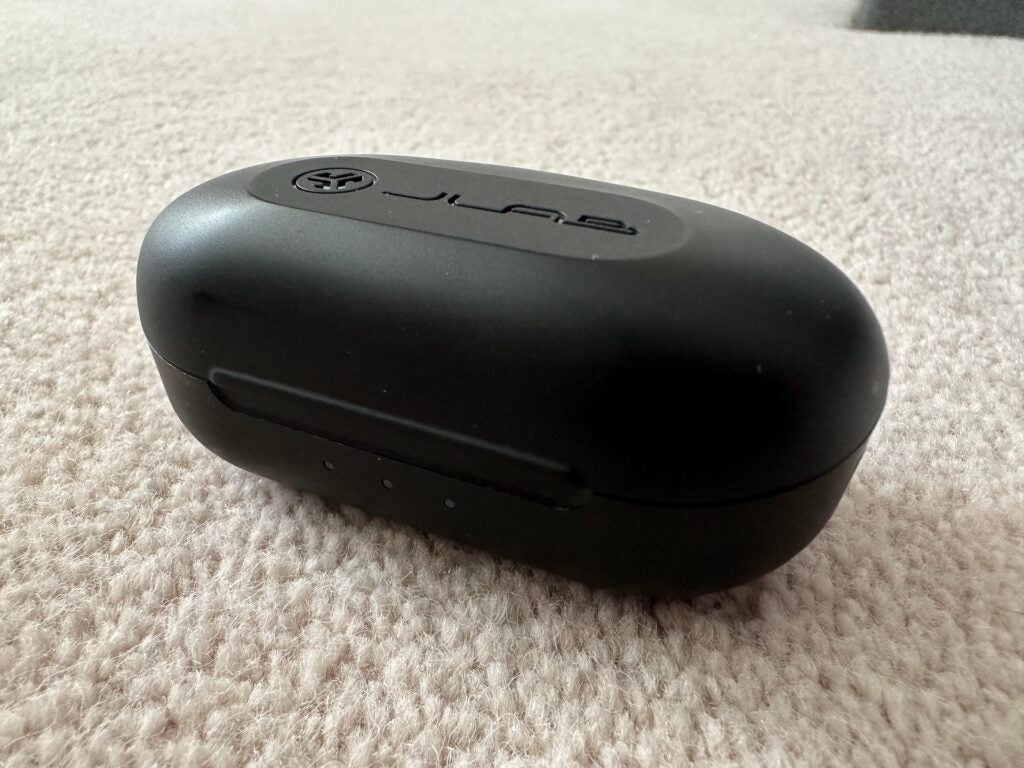
There’s also no accompanying app, which is hardly surprising for a £50 pair of earphones, but there are three built-in EQ settings: JLab Signature, Balanced, and Bass Boost. You cycle through them by triple-tapping the left earbud, which, as mentioned above, can take a couple of goes. No app also means there’s no way to customise any of the commands, so you can’t turn off the ones you don’t use and simplify things a bit.
A long press activates Movie mode, which reduces latency so that things stay in sync when you’re watching videos on the move. I do find it works, ensuring there’s no lag between people’s lips moving and what you hear them say, but if you’re not sure whether it’s turned on or not the only way to find out is to watch a video and toggle between the two to see if it makes a difference. That’s not a huge issue, but it doesn’t feel like brilliant design to me.
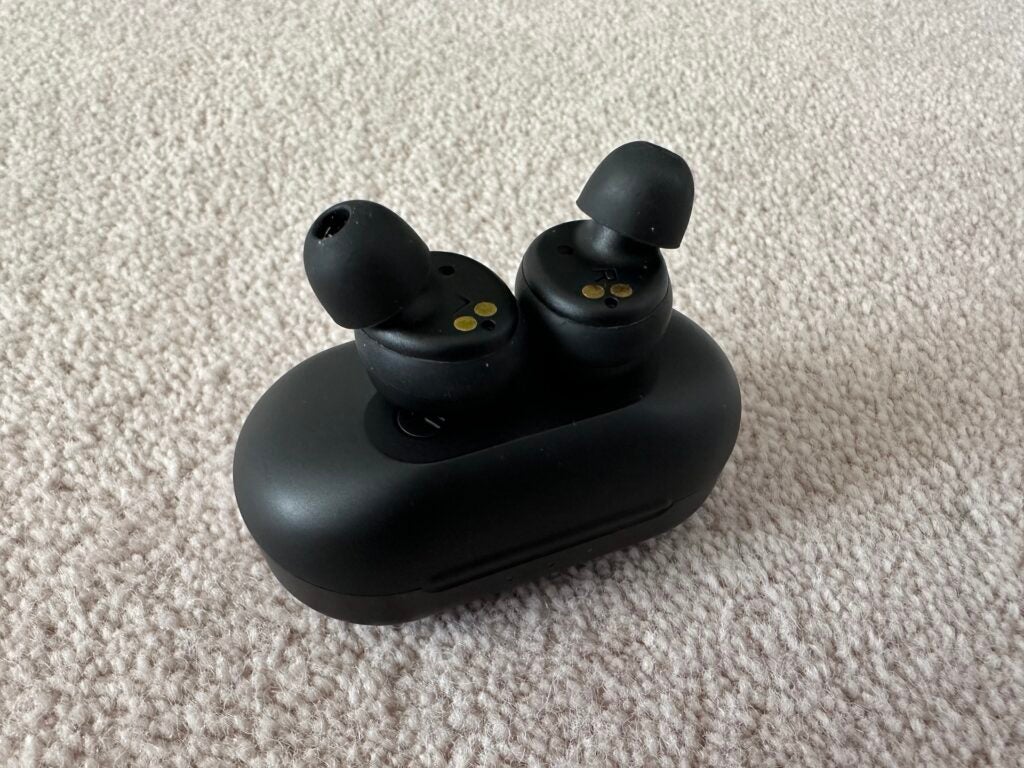
JLab claims a total battery life of 36 hours (nine in the buds and 27 more from the case), which you might get if you keep the volume to a minimum, but is slightly generous based on my real-world testing. Every time I put them in my ears I got audio feedback to indicate how much is left, although it’s fairly vague – just ‘low’, ‘medium’ or ‘full’.
It’s not mentioned anywhere on the packaging or in the instructions but the Jbuds Air Pro also work with the Tile app. Once set up, you can use your phone to trigger an audible SOS from the buds, whether they’re in the case or not, with a graphic on the screen showing how far away they are based on the strength of the Bluetooth connection.
When you get very close, your phone will also vibrate to warn you they’re nearby. That extra feedback is handy, because the sound they emit is hardly ear-splitting.
Sound Quality
- Overly bassy performance
- No especially loud
Paying £50 for a pair of buds and then expecting them to deliver audiophile-pleasing sound quality would be foolish, so it’s no real surprise that that isn’t what you get here either.
No matter which EQ mode you select – Balanced, Bass Boost or JLab Signature – the JBuds Air Pro are keen to emphasise the bottom end. The instruction manual says JLab Signature is best for “most music” while Bass Boost is designed for “working out”, but both overdo the bass so drastically that it overwhelms the other frequencies and makes the two modes hard to tell apart, especially considering the audio feedback when switched between them doesn’t specify which one is selected.
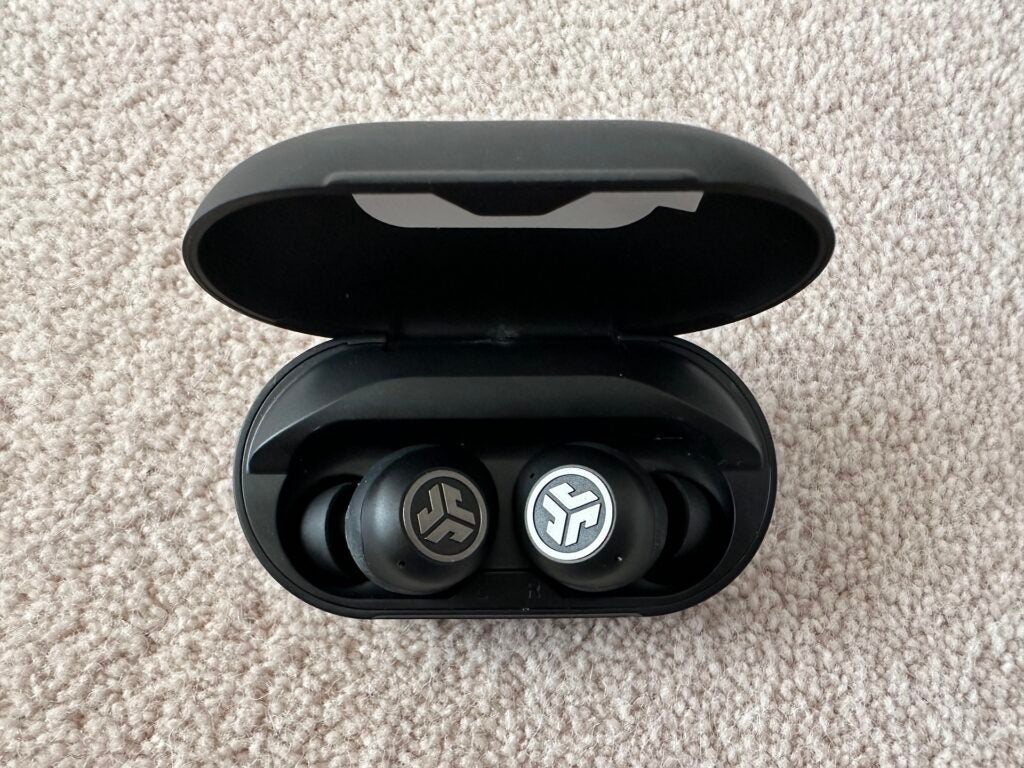
Stick to Balanced mode – best for “classical music, podcasts and audiobooks” apparently – and the audio performance is much more, well, balanced – but it’s not totally immune to the issue. On Boygenius’s Anti-Curse, the vocals of all three singers sound natural and clear, but the bottom end is still dominant, while Joe Lally’s bass on Fugazi’s Furniture can be quite boomy.
Play something like Fred Again’s Mike (Desert Island Duvet) and this bassy performance suits the song, with the haunting piano line, Mike Skinner’s poetic lyrics, and Dermot Kennedy’s vocal all coming together with suitable drive and presence.
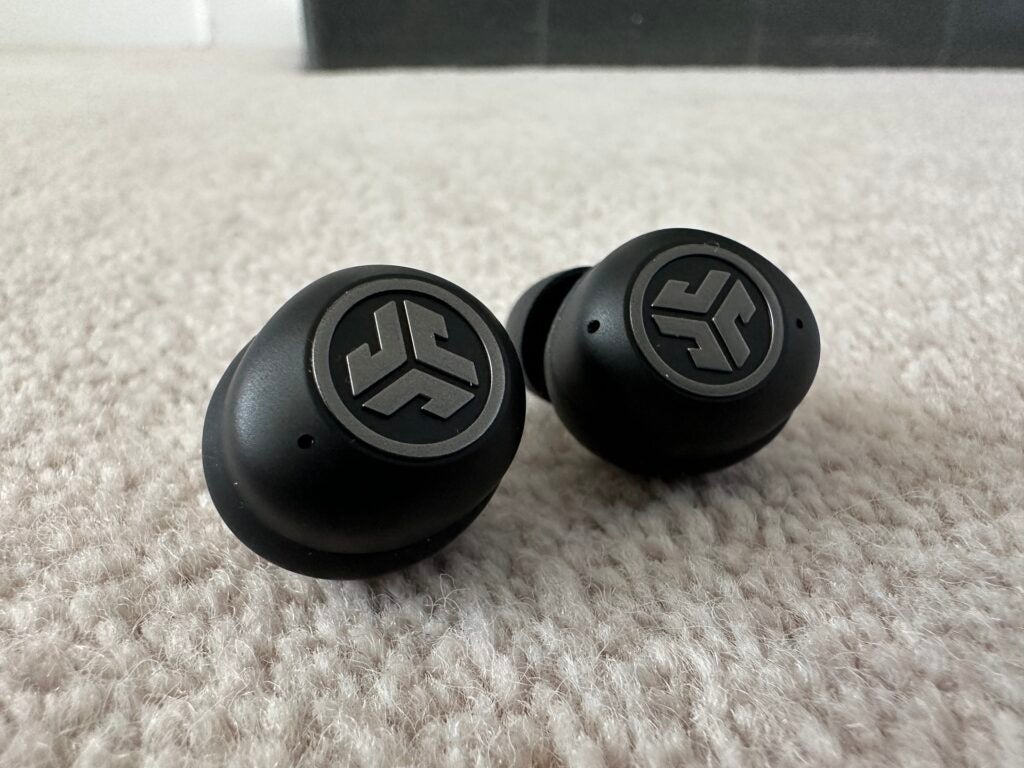
Switch to something with less bass in the mix, such as Laura Stevenson’s Moving Cars, and the issue largely disappears. Her vocals are well presented, and while the plucked acoustic guitar perhaps lacks a little texture it’s certainly a much more even presentation.
Ironically, you need to make sure you have the right ear tips attached, because if they don’t fit snugly the JBuds Air Pro will sound airy and thin, which is hard to believe after you’ve heard what they sound like with the Bass Boost switched on.
Latest deals
Should you buy it?
If you’re always losing USB cables: The charging case for the JBuds Air Pro has the USB cable built in, so if you’re prone to losing yours you won’t need to worry.
If you don’t like bass: Even in Balanced mode these are bass-heavy buds that emphasise the bottom end, sometimes to the detriment of the other frequencies.
Final Thoughts
If you like bass you’ll get on well with the JBuds Air Pro. It’s hard to imagine anybody enjoying how they sound in Bass Boost or JLab Signature mode, and they lack the detail, clarity and musicality that more expensive pairs deliver, but stick to Balanced mode and the performance is more than acceptable for a pair of £50 buds.
The problem is there are plenty of alternatives out there that sound better. So while the connection is generally solid, battery life is decent, and the cable built into the case means you don’t have to carry a separate one around, there’s not a lot here to make anybody choose the JBuds Air Pro over any other similarly priced pair.
How we test
We test every set of headphones we review thoroughly over an extended period of time. We use industry standard tests to compare features properly. We’ll always tell you what we find. We never, ever, accept money to review a product.
Find out more about how we test in our ethics policy.
Tested with real world use
FAQs
The earphones carry an IP55 rating so they can repel some water and dust but they’re not waterproof.
Sustainability
Trusted Reviews’ holds the fact that global warming is not a myth as a core value and will continuously endeavour to help protect our planet from harm in its business practices.
As part of this mission, whenever we review a product we send the company a series of questions to help us gauge and make transparent the impact the device has on the environment.
We currently haven’t received answers to the questions on this product, but will update this page the moment we do. You can see a detailed breakdown of the questions we ask and why in our sustainability info page.
Jargon buster
Bluetooth multipoint
Bluetooth multipoint is a device’s ability to connect to two or more devices simultaneously over a Bluetooth connection
IP rating
An abbreviation for ‘Ingress Protection Code’, which lets you know to what extent a device might be waterproof or dustproof.


















